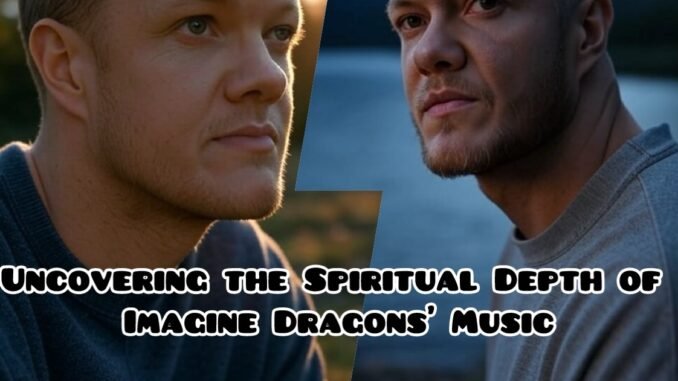
Beyond the Beat: Uncovering the Spiritual Depth of Imagine Dragons’ Music
Imagine Dragons, the Las Vegas-born rock band, has captivated millions with their anthemic soundscapes, pulsating rhythms, and introspective lyrics. Since their breakout hit “Radioactive” in 2012, the band—fronted by Dan Reynolds—has woven a tapestry of music that transcends mere entertainment, delving into themes of existential searching, personal struggle, and spiritual awakening.
Beneath the infectious beats and soaring melodies lies a profound exploration of the human spirit, making their work resonate on a deeper, almost transcendent level.
This essay uncovers the spiritual depth of Imagine Dragons’ music, examining how their lyrics and sonic choices reflect a quest for meaning, redemption, and connection with something greater.
At the heart of Imagine Dragons’ music is a raw, unflinching confrontation with life’s complexities. Songs like “Demons” from their debut album Night Visions grapple with inner turmoil and the duality of human nature.
The lyric, “When you feel my heat, look into my eyes / It’s where my demons hide,” speaks to the universal struggle of concealing one’s flaws while yearning for authenticity.
This introspective honesty mirrors spiritual traditions that emphasize self-awareness as a path to growth. Reynolds’ delivery, both vulnerable and defiant, invites listeners to face their own shadows, echoing the teachings of figures like Carl Jung, who viewed confronting the “shadow self” as essential to wholeness.
The band’s ability to pair such heavy themes with uplifting melodies creates a cathartic experience, suggesting that hope can emerge from even the darkest places.
The band’s spiritual undertones are perhaps most evident in their exploration of existential questions.
Tracks like “Whatever It Takes” and “Believer” from their Evolve album reflect a relentless pursuit of purpose. In “Believer,” Reynolds sings, “I was broken from a young age / Taking my sulking to the masses,” transforming personal pain into a universal anthem of resilience.
The song’s thunderous percussion and triumphant chorus evoke a sense of rising above adversity, akin to spiritual rebirth.
This aligns with existentialist philosophies that find meaning through struggle, as well as religious narratives of redemption through suffering. The band’s music often feels like a modern-day psalm, blending despair and triumph in a way that speaks to both the secular and the sacred.
Imagine Dragons also taps into a collective yearning for connection with something greater.
Their song “Thunder” uses natural imagery—lightning, thunder, and storms—to symbolize moments of divine or cosmic revelation. The repeated refrain, “Thunder, feel the thunder / Lightning and the thunder,” pulses with primal energy, evoking the awe of encountering the sublime. This resonates with spiritual traditions that view nature as a conduit to the divine, from Native American reverence for the elements to the Romantic poets’ worship of the natural world. By framing personal ambition within this cosmic imagery, the band suggests that individual journeys are part of a larger, universal narrative.
The band’s later work, such as Mercury – Act 1 and Act 2, deepens this spiritual exploration. Songs like “Wrecked” and “Follow You” confront mortality, love, and the search for meaning in a chaotic world. “Wrecked,” written in the wake of personal loss, grapples with grief while seeking solace in memory and connection. The lyric, “I’m wrecked, I’m a wreck / But I’m still holding on,” captures the tension between despair and perseverance, a theme central to many spiritual traditions. Meanwhile, “Follow You” celebrates unconditional love as a guiding light, echoing the devotional aspects of faiths that view love as a divine force.
These songs showcase the band’s evolution from introspective anthems to meditations on life’s impermanence and interconnectedness.
Sonically, Imagine Dragons enhances their spiritual themes through deliberate musical choices.
Their use of expansive soundscapes—layered harmonies, booming percussion, and ethereal synths—creates a sense of vastness, as if their music is reaching for the heavens.
Tracks like “Radioactive” and “Natural” blend gritty, industrial sounds with soaring, almost choral elements, mirroring the tension between the earthly and the divine.
This sonic duality reflects the band’s lyrical preoccupation with bridging the human and the transcendent.
Critics sometimes dismiss Imagine Dragons as overly earnest or commercial, but this overlooks the band’s ability to make the spiritual accessible.
Their music doesn’t preach; it invites. By framing universal struggles—doubt, pain, hope, and love—within anthemic rock, they create a space where listeners can confront their own questions of meaning.
Whether through the lens of faith, philosophy, or personal introspection, Imagine Dragons’ music speaks to the soul’s longing for purpose and connection.
In a world often marked by cynicism, Imagine Dragons’ music offers a counterpoint: a sincere, spiritual quest wrapped in electrifying sound. Their songs are not just melodies but invitations to reflect, heal, and rise.
By blending raw emotion with cosmic imagery and universal themes, they remind us that the search for meaning is both deeply personal and profoundly shared—a journey that resonates far beyond the beat.
Leave a Reply